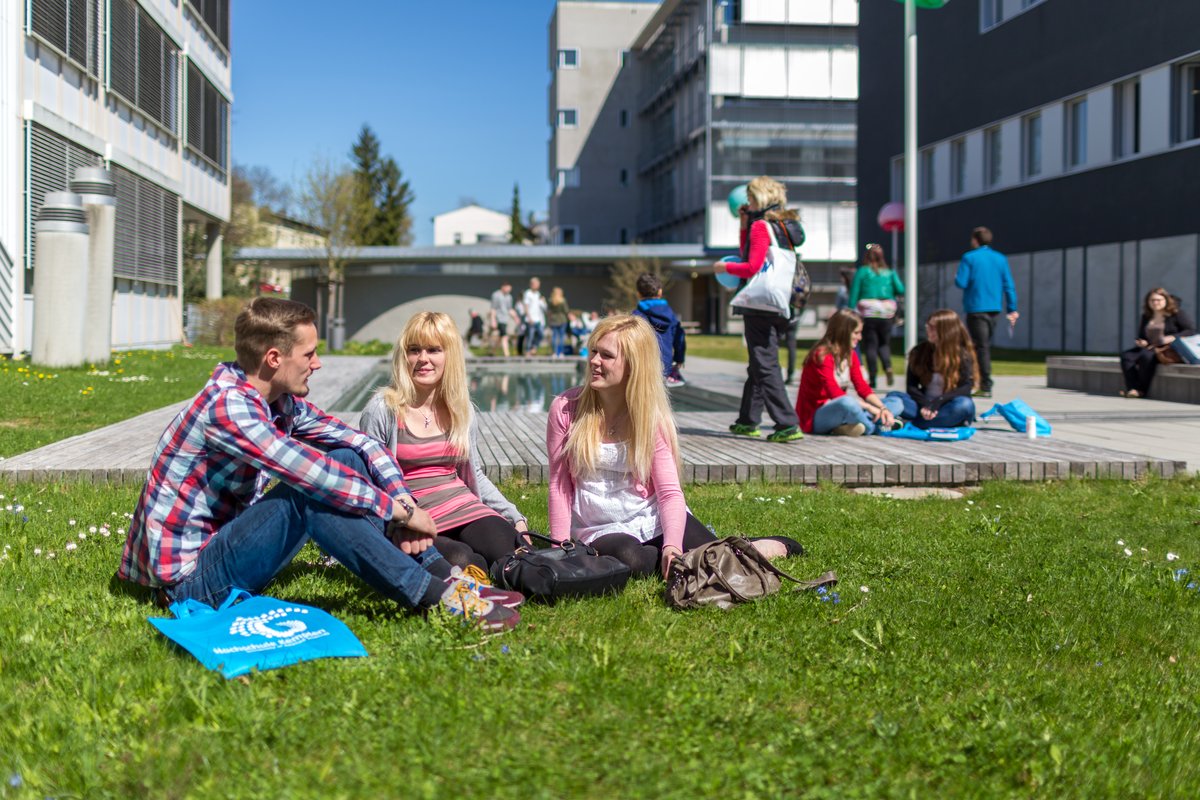
Would you like to support people in challenging circumstances? Assist them in sorting their lives? Help them to help themselves? The degree programme in Social Work prepares you for precisely this kind of professional activity. It’s a fact that social work is a permanent linchpin in the system – and in this valuable role you will assume responsibility for our society. Graduates from this degree programme also recognised by the state as social pedagogues.During the course of your degree programme, you will engage with societal developments and social problems. You will learn about and apply the theories and methods of social work, familiarise yourself with the legal, economic and socio-political framework – and develop your own professional self-perception with our support.
The degree programme in Social Work qualifies you to work with individuals and families, groups and communities, and urban and rural authorities. The focus is always on stabilising the social fabric and overcoming or avoiding predicaments – ensuring social participation and realising basic rights. You will learn to deal with complex issues that arise from the fact that we don’t live in isolation, but interact socially with other people.
Throughout your studies, we support you with tutorials, learning and working in groups, advanced options to build on compulsory elements, and personal mentoring for internships and your bachelor’s thesis. In addition, you can expect practically relevant teamwork and learning, a friendly atmosphere and professors who know you by name.
At a glance
Award
Bachelor of Arts (B. A.)
Study mode
full-time
Standard duration
7
ECTS credits
210
Starts
winter semester
Restricted admission
yes
Taught in
German
Faculty
Social and Health Studies
Study abroad
optional
Maximum number of participants
119
Accreditation
AHPGS
Details about this course
Throughout the first three semesters, we will familiarise you with the basic theoretical principles and application-focused skills used across the full spectrum of social work. The fourth and fifth semesters are devoted to practical skills, teaching you concepts for action plans that you will use for acquiring considered hands-on experience during your internship. During the final two semesters, you will enhance your knowledge in your personal choice of majors – either Inclusion, Health Promotion and Disease Prevention, Social Work with Adults, or Child and Youth Support.
You then round off your degree by writing your bachelor’s thesis. The university awards students who successfully complete the programme the academic title Bachelor of Arts (B.A.) and the right to use the professional title “state-certified social educationalist” (in accordance with BaySozKiPädG).
Professional environment:
Social work remains one of the expanding professional fields – opening up a very wide range of graduate career prospects in the public sector, supporting people one-on-one in their particular living environments and helping them to improve their circumstances in life. This frequently involves working in interdisciplinary teams with other professions in all kinds of settings, e.g. with authorities, child and youth support services, schools, clinics, companies, or support and care facilities.
Career prospects:
The long-term high demand for qualified specialist social educationalists offers you excellent career prospects. Your state certification as a social educationalist meets the formal criteria for many official appointments and ranks. This qualification thus opens up a broad spectrum of potential careers in various aspects of social work or social education requiring a university degree in these subjects.
Fields of activity:
As a graduate from this degree programme, you can practise in all areas of social work, e.g.:
- Child and youth support (such as youth welfare offices, open-access child and youth work, social work in schools, to name just a few examples)
- Assistance in special situations in life (such as helping the homeless, debt counselling, helping asylum seekers/applicants, probation support, pregnancy counselling, in women’s refuges, to name just a few examples)
- Assisting with disabilities and health issues (such as everyday help, social services in hospitals, specialist advice e.g. AIDS, addiction, disease prevention and health promotion, to name just a few examples)
- Supporting the elderly (such as in centres for senior citizens, care facilities, policy for elderly citizens, to name just a few examples)
Application process:
We have pooled all the information and details you might need about applying and the admission requirements .
About you:
You are open-minded towards people in all sorts of life situations and able to recognise social developments. You are clearly very adept at communicating and empathetic, good at planning, patient, and can tolerate tension. You are particularly interested in social issues, including legal and organisational aspects.
We ascribe to the values of openness, tolerance and acceptance. Our aim is to teach everyone involved at Kempten University of Applied Sciences about education in an international context. As part of this aspiration, we support university-wide, inter-faculty measures to promote international projects and cross-cultural interaction.
The B.A. degree programme in Social Work also offers a semester abroad as part of the advanced course. Students can contemplate studying abroad from semester 4 on. You can easily spend your practical semester abroad; or another very viable option is to study abroad during semester 6 or 7 if you choose to major in International Social Work.
Are you interested in learning more about our international aspirations and the options for you to study abroad? Take a look at the information posted in our portal.
- Module Matrix – Social Work ( 185 KB / pdf)
- Module Handbook – Social Work (in German) ( 2 MB / pdf)
- Trained occupations eligible to study without an academic university entrance qualification (“Abitur”) / occupational quotas ( 290 KB / pdf)
We compile all study programme and examination regulations centrally for you. There you will find all versions and changes. continue
Master's degree programmes
Graduates from this bachelor’s degree programme can go on to study on the following master’s degree programme at Kempten University of Applied Sciences:
Programme with extended practice
Would you like to combine study and practice? With pleasure! The Kempten University of Applied Sciences offers you the following opportunity to study with more practice:
Studies with in-depth practice – practical and flexible!
In the study programme with in-depth practice, a regular Bachelor's programme at the university is combined with intensive practical phases at a practice partner, based on the study content. Students can enter this study option up to the 4th semester.
You can find more information about the offers here.
Further details about the degree programme
Contacts
We know how exciting the prospect of going to university can be. So we want you to know whom you can get in touch with if you have any questions about studying with us.
- Student Advisory Service
For general questions about studying and applications, please contact the Student Advisory Service. - Academic advice
If you are interested in this degree programme and would like to ask any specific questions, please contact the academic advisor.
If you are already studying Social Work and have any questions, please feel free to get in touch with Professor Ursula Müller or Professor Patricia Pfeil.
Basic internship
You must have completed a basic internship in fields of social work, lasting at least 90 hours, by the end of the first three semesters. It is possible, and even recommended, to already cover this requirement voluntarily before starting the programme. A technical college certificate relating to the social sector sector, vocational training in the social sector, voluntary social work or other social activities can be counted as a basic internship under certain conditions. You can download further information in the “Guidelines for the basic internship”.
State certification
Social work is a profession that generally requires state certification .
The Bavarian Social and Childhood Pedagogy Act (abbreviated to: BaySozKiPädG) has historically used the official job title: “State-certified Social Educationalist” / .
Important: Universities of applied sciences in Bavaria don’t issue state certification .
You can use this job title as long as you
1. Have graduated from an appropriate degree programme and
2. Are personally suitable – i.e. no previous convictions that would cast doubt upon your suitability.
You can prove this in the form of a current certificate of good conduct and the degree certificate .
Official confirmation that our degree programme B.A. in Social Workmeets the requirements specified in BaySozKiPädG is provided here: https://www.verkuendung-bayern.de/baymbl/2025-266/
Hence your degree certificate contains the remark:
“Having completed this degree programme, this graduate is allowed to use the professional title “State-certified social educationalist” according to Article 1 Para. 1 BaySozKiPädG. However, personal suitability is to be judged by the employer.”
FAQ
What can I major in?
On the advanced course, you will have the chance to fine-tune your personal profile. During the 6th and 7th semesters, you will choose which subject to major in from the following options:
- Inclusion
- Health promotion and disease prevention
- Social work with adults
- Child and youth support
- International social work
- Clinical social work
- Precarious life circumstances
- Work, care and life circumstances
- Migration and diversity
- Media and digital competence
In addition to these subjects, you can also spend either your 6th or 7th semester studying at a foreign university if you wish to major in “International social work”.
Are there special admission requirements, e.g. vocational training or practical experience?
No. You only require a school-leaving certificate demonstrating your eligibility for university. (Further details can be found under Entry requirements.) However, ten percent of the places on this degree programme are allocated to applicants with relevant occupational training (known as the vocational or occupational quota – check the file on fields of training for admission via the occupational quota in the Downloads section). In this respect, relevant occupational training is an advantage for getting accepted onto the programme – and it will also benefit you during the programme itself.
Is it possible to study this degree programme part-time as a professional, part-time per se, or remotely?
In principle, it is up to you how you spend your time outside classes, so working on the side is an option. However, it currently isn’t possible to study Social Work part-time, i.e. taking fewer classes per semester for a longer duration. Nor is this degree programme offered as a professional part-time programme, i.e. there are no evening classes or study blocks to fit around working commitments. Remote studies are also not possible. You can only study this degree programme full-time on site.
What is the timetable like? When are lectures held?
This varies from one semester to the next (in the same way as school timetables). The schedule for modules and classes is set one to two months in advance of each semester, and you can inspect it once you are accepted and have enrolled on the degree programme. As this is a full-time degree programme, you must reckon with classes being scheduled for each day of the week, even if there is sometimes one day without. In rare cases, there might be a block of classes on a weekend (freeing up more time during the week as a result). You should definitely plan enough time to prepare and follow-up on seminars.
Is attending classes obligatory?
No, but we strictly recommend it. For one, teaching – and thus learning successfully – thrives on direct exchange amongst students and between students and lecturers. Plus experience has shown at least a loose correlation between attendance and achieving good results. In other words, the students who fail exams or scrape through with weak grades tend to be those who previously rarely attended the corresponding classes.
Are lectures also presented in English? If so, how many – and do I also have to take exams in English?
This degree programme is taught in German. In some cases, a course might also be offered in English, in which case this would also apply to the exam. But this really shouldn’t cause you to worry, as this really happens very rarely – so far mainly as an elective option – and the English that you learned in school, even it was a long time ago, is entirely sufficient.
What is the cut-off mark for the numerus clausus (NC)? What are my chances of getting onto the programme if I apply?
The number of places on the course is limited (“numerus clausus”). We cannot reliably predict the minimum average grade you will need to achieve on your school leaving certificate, as depends on the batch of applicants in each case. Your chances of being admitted decrease/increase in direct proportion to the number of applicants and their school-leaving grade. In other words, the better your school-leaving grade and the fewer the applicants, the better your chances are of getting onto the course – and vice versa. You can find details of the cut-off grades for previous application rounds here.
What are the semester dates, and do students have any commitments during vacation time?
The semester dates are shown in the university calendar. Dates. You can use the vacation time between semesters for further study, if required, but as a rule there really aren’t any commitments during those times.
What does the course cost?
There are no tuition fees for this degree programme. The only expenses will be the usual costs associated with studying, such as the semester fee, photocopying and books. There might also be some (minor) charges for field trips and travel expenses to off-site study locations.



